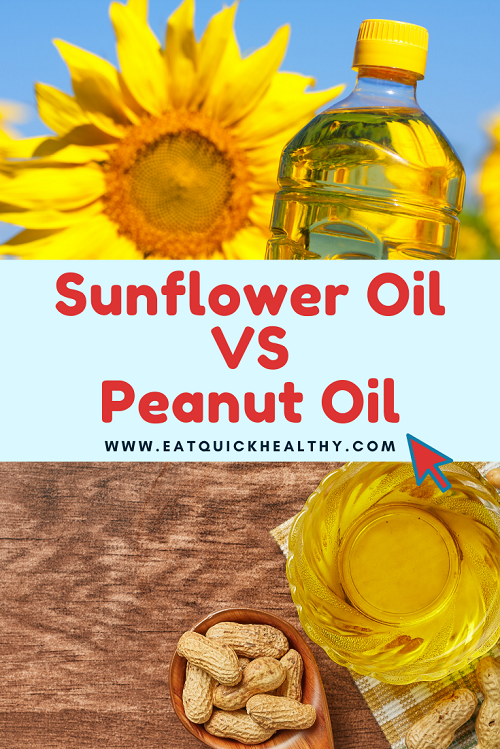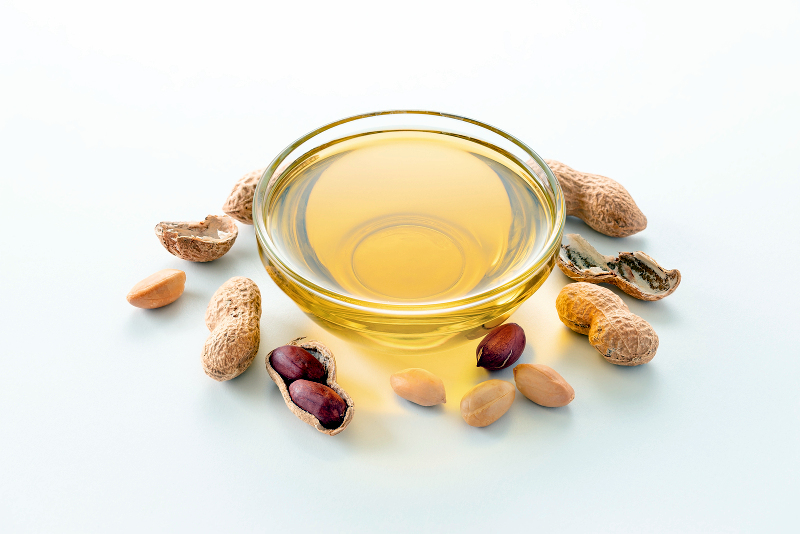So, you want to know whether sunflower oil or peanut oil is the best? Well, you’ve come to the right place! By the end of this blog, you’ll be a sunflower oil and peanut oil expert, knowing exactly which one you want to keep in your cupboard. And who knows, maybe you’ll want to have both of them on hand.
Here you’ll find a breakdown of the differences between both oils, and their respective pros. We cover everything from the oils’ uses, benefits, and compositions. We’ll also tell you which one is cheaper, so keep reading to learn what’s the best oil to buy.

What Is Sunflower Oil?

As given away in the name, sunflower oil is derived from sunflowers and is a cooking oil that is very popular in Eastern Europe.
You can typically find two forms of sunflower oil in the supermarket, refined and cold-pressed. Refined sunflower oil is neutral-tasting, which is great when you don’t want to alter the taste of the food you’re cooking.
Cold-press sunflower oil is meant for low-heat cooking and has a buttery or nutty taste to it. There are more nutrients in the cold-press version.
Is Sunflower Oil Healthy?
You’ll find a large amount of polyunsaturated fats in sunflower oil, which means there are health benefits to consuming it like aiding in managing cholesterol levels.
There are vitamin E properties in sunflower oil as well. However if you cook with it at a high heat, some of the health benefits are potentially decreased,
Benefits Of Sunflower Oil
There is a laundry list of benefits from sunflower oil. We already mentioned a few health benefits, but others include the potential of preventing arthritis, asthma and cancer, as well as the improvement of digestion and heart health.
It’s also known to be a good alternative to maintain healthy skin.
What Is Peanut Oil?

Peanut Oil is another great cooking tool to use in the kitchen, especially for frying food. Refined peanut oil has a high smoke point, meaning it’s a popular oil used by restaurants and at-home cooks for deep frying. It’s made by extracting the edible seeds from a peanut planet. The seeds are taken and then used by companies to make this plant-based oil
If you’re shopping and want to pick up some peanut oil, but you only see groundnut oil or arachis oil, don’t fret. They’re the same thing as peanut oil. And depending on which peanut oil you get, the taste will vary.
Peanut oil isn’t just used in the kitchen, however, as some claim it has medicinal benefits, helping with things like constipation, heart disease and joint pain. Besides refined peanut oil, you can also find cold-press peanut oil and gourmet peanut oil, as well as different kind of blends.
Is Peanut Oil Healthy?
Just like most things, there are pros and cons to the healthiness of peanut oil. First, it’s high in vitamin E, which is something your body needs to be protected from free radical damage and to help fight and prevent heart problems. If you’re diabetic, then peanut oil can also aid in lowering your blood sugar levels.
On the other end, omega-6 is prominent in peanut oil. The fatty acid is linked to negative consequences, like inflammation and other health issues. Also, oxidation can be an issue with peanut oil.
Benefits Of Peanut Oil
As we just mentioned, there are defined health benefits to peanut oil, including the high dose of vitamin E and the property that helps regulate blood sugar. Further, it also has a history of benefiting skin because of the vitamin E content, including helping fight premature ageing, wrinkles and blemishes.
From a cooking aspect, peanut oil is convenient to use for deep frying because of its high smoke point.
Sunflower Oil Vs Peanut Oil
There are several factors to consider when comparing sunflower oil to peanut oil. We’ll go over important components, including oil composition, smoke point, deep frying capabilities, other uses and potentially mixing the two together.
Oil Composition
You’ll find that sunflower oil is mostly made up of unsaturated fat, roughly 85%, with 15% of it being saturated fat. Specifically, lionleic acid is the most prominently found, followed by oleic acid.
Half of peanut oil is comprised of oleic acid, and around 30% of it is palmitic acid. Lignoceric acid, Behenic acid and Arachidic acid make up the rest of peanut oil.
Peanut Oil Vs Sunflower Oil Smoke Point
When comparing sunflower oil vs peanut oil, it’s good to know that they both have high smoke points. If you purchase refined sunflower oil, it’ll typically be able to withstand heat of up to 475 degrees Fahrenheit/246 degrees Celsius, before burning.
As mentioned, peanut oil is a popular oil used by restaurants because of its deep frying capabilities. Typically, peanut oil has a smoke point of up to 450 degrees Fahrenheit, which is around 232 degrees Celsius.
Sunflower Vs Peanut Oil For Deep Frying
Both sunflower and peanut oil are prime alternatives for deep frying. When using the refined option of either oil, you’ll benefit from a high smoke point, which is crucial for deep frying.
An important thing to consider is taste, however. Although peanut oil doesn’t absorb the taste of food, it has its own, and the potency of it depends on the brand and kind you buy. Sunflower oil has a neutral taste, so you know the taste of your dinner won’t be changed by the oil.
But if the taste isn’t an issue, then both peanut oil and sunflower oil are virtually interchangeable for deep frying.
Other Uses
As mentioned, both oils have uses that go beyond just cooking. Both sunflower and peanut oil have medicinal uses, boasting a high level of vitamin E, as well as helping you maintain a healthy heart and ageless skin.
Most medicinal benefit claims are anecdotal in nature, however peanut oil has been linked to alleviating joint pain and constipation. And it’s a great thing to use to moisturize dry skin. Potential medicinal benefits from consuming sunflower oil include preventing cancer, asthma and arthritis, and mitigating heart and digestion issues.
Can You Mix Peanut And Sunflower Oil?
If you have both peanut oil and sunflower oil in your cupboard, but you’ve run low on them, you can technically mix them together. Now, mixing oil usually comes with the caveat that it’s always best to just stick with one type of oil while cooking, as different oils have varied cooking properties.
But since they both have such a high smoke point, they can be mixed. And remember, peanut oil has a bit of a taste to it, so that could alter your dish if you have a rather potent product.
Lastly, if you’re cooking for a large number of people and you don’t know everybody’s allergies, it’s likely best to just go to the store and buy sunflower oil as you then won’t have to worry about sparking up someone’s peanut allergy.
Other Things To Consider
If you’re curious about comparing the price of peanut oil and sunflower oil, know that peanut oil is slightly less expensive per 100 millilitres. So if you’re planning on purchasing oil in bulk, you may be best served by choosing peanut oil over sunflower oil if the price is your biggest concern.
Conclusion
In this guide, we’ve extensively covered the difference between peanut oil and sunflower oil. As for the winner of which is best, it’ll depend on the criteria you use. If you want as high of a smoke point as possible, sunflower oil may be your option. And if you want to save money, peanut oil is the best as the two are very close in utility and property.
So, consider all of the different components in this breakdown and head over to your local supermarket to buy some oil!
Wondering about the differences between canola oil and peanut oil? Click here to find out! Or peanut oil and soybean oil? Click here. You can also find all our peanut related guides here. You can also find all our peanut related guides here.



Comments are closed.